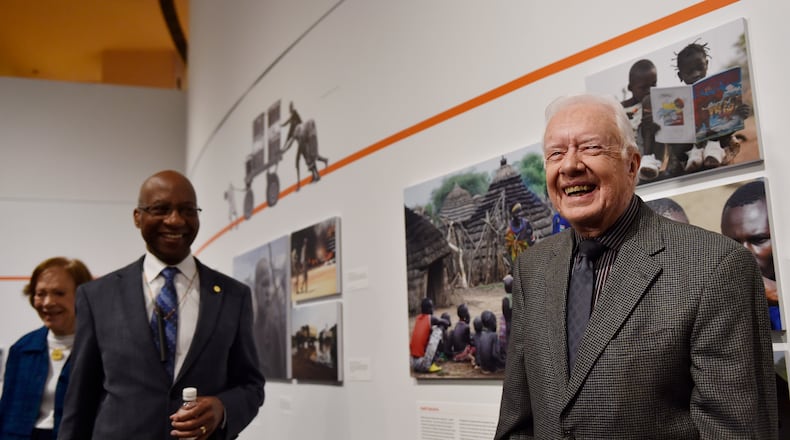Jimmy Carter is getting closer to finally having Guinea worm disease’s number.
The 93-year-old former president has said he hopes to outlive the last guinea worm. On Wednesday, it was announced at The Carter Center that South Sudan has stopped transmission of Guinea worm disease in that African country.
"This is a great achievement for our young nation," South Sudan health minister Dr. Riek Gai Kok said at a press conference during the the global Guinea Worm Eradication Program's 22nd annual review at The Carter Center. in Atlanta. "Today, the dream has come true."
Guinea worm disease is a painfully debilitating parasitic condition which occurs when people ingest larvae in unclean water. As of the end of February 2018, South Sudan, which gained independence from Sudan in 2011, had recorded zero cases of Guinea worm disease for 15 consecutive months (The Guinea worm life cycle is about a year, and a 15-month absence of cases “indicates the interruption of transmisson,” The Carter Center says).
In 2017, in fact, just two countries -- Chad and Ethiopia -- reported a total of 30 cases. That’s down from approximately 3.5 million cases found in 21 countries back in 1986, when The Carter Center began leading the international campaign to eradicate Guinea worm disease.
Carter wasn't at Wednesday's event, choosing instead to be in Plains with his wife, Rosalynn, 90, who reportedly is recovering well from recent intestinal surgery. But the Nobel Peace Prize winner's absence didn't lessen the significance of the news, which he hailed in a statement.
“The people and government of South Sudan have achieved a great milestone in the worldwide effort to eradicate Guinea worm disease,” Carter said. “We are within reach of a world free of Guinea worm disease.”
If so, that would make it only the second human disease in history, after smallpox, to be eliminated. And what South Sudan has achieved so far (Guinea worm-free areas undergo a three-year surveillance process before final certification by the World Health Organization) is that much more remarkable given the “extraordinary handicaps” the program there started with, said Dr. Donald R. Hopkins, the Carter Center’s special advisor for Guinea worm eradication.
When the Sudan Guinea Worm Eradication Program began in 1995, the country was riven by a prolonged civil war. Because that hampered access by health workers and others to many areas where the disease was endemic, Carter that year brokered the “Guinea Worm Cease-Fire.” Fighting was suspended for almost six months, during which time the program “was able to access more than 2,000 Guinea worm-endemic villages,” the Carter Center says.
Kok on Wednesday suggested that stopping Guinea worm in its tracks goes well beyond improving lives in his own country.
“We feel we have contributed to the common cause of humanity today,” South Sudan’s health minister said. “That we have played our part in realizing that dream of ridding the world of that disease called Guinea worm.”
About the Author
Keep Reading
The Latest
Featured



